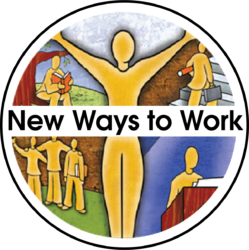Principles of Practice
At New Ways to Work, we believe that all schools and youth programs, educational opportunities, training programs and support services need to be connected and coordinated to best serve young people.
We help local programs build the four elements of our All Youth-One SystemTM framework. These elements apply to all youth and should be addressed by any efforts seeking to prepare youth and young adults for the future. Addressing these elements in isolation simply doesn’t get the job done. The elements include academic achievement, career development, community connections and support, and youth leadership. They are delivered through a comprehensive and connected youth development approach.
We engage local partners to support these elements and work closely with schools, community organizations, workforce boards, colleges, social service agencies, government, philanthropy and the private sector. We provide strategic planning support as well as direct technical assistance and training to agencies, youth programs and program staff, schools and others at both the leadership and line staff level.
